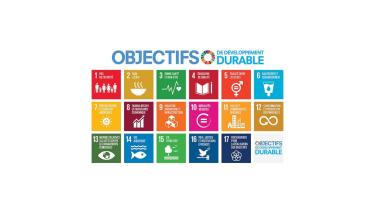On this page, you'll find a report on all the actions and activities initiated at the University of Namur in connection with United Nations Sustainable Development Goal #15: "Life on Earth".
Social impact and actions
Institutional initiatives
The Domaine d'Haugimont
Located in the heart of the Condruzian countryside, the Domaine d'Haugimont spreads out over the commune of Gesves, 18 km southeast of Namur. Since 1978, it has been an exceptional teaching and research site for students (of veterinary medicine, economics, geology and history) and scientists from the University of Namur. It is also open to the public and schools for training, discovery and leisure activities. Finally, the UNamur Sheep Research Center offers specialized training courses for breeders.
Among the many initiatives carried out at the Haugimont estate:
- Haugimont duck farm.
- Collection of old varieties of wheat at Haugimont for the establishment of a bread-making wheat sector in the Cœur de Condroz territory.
- Vast flock of ewes (400) with production of lambs for consumption and valorization of the wool in Verviers.
- Amendment of the Haugimont meadows solely by composting the ewes' bedding.
- Testing the first anti-wolf fence: UNamur is a member of the wolf network as a sheep producer.
- Vastes vergers, where the public is invited each year to take part in apple picking during the traditional "maraude".
More info on events at Domaine d'Haugimont.
Recognized as Site of Great Biological Interest, the Domaine d'Haugimont is home to many remarkable animal and plant species.
New projects:
- the creation of an approved nature reserve
- the creation and maintenance of new ponds
- the extension of the resilient forests project to chalarose ash groves.
- Pro Silva silviculture project entitled
- Participation in the "Forêts résilientes" project (Wallonia Recovery Plan): "30 years of Pro Silva silviculture at Haugimont (UNamur): ecological and economic assessment - Lessons and prospects for resilient forests in Wallonia". Find out more.
More info on the domain of Haugimont.
Calls Campus Namur Durable (CaNDLE)
Since 2013, the Campus Namur Durable (CaNDLE) calls have been designed to invite the university community to propose actions whose aim is to make the campus and university activity more sustainable in the short, medium and long term.
The first and second CaNDLE calls contributed, in 2013 and 2015, to the realization of eight projects likely to improve the sustainability of the campus or university activity. The 2021 call saw the launch of five new eco-responsible initiatives proposed by UNamur members and funded by the Jerome Fund for Sustainable Development.
In 2023, UNamur launches a fourth CaNDLE call funded thanks to the joint support of the Jerome Fund for Sustainable Development and the Assembly of Circles of UNamur students. A total of 7 projects are being funded in this call.
Nest boxes in Namur for swifts
As part of the CaNDLE "Apus au campus" project, several swift nests are present on buildings on the UNamur campus. A conservation project run by several URBE researchers in collaboration with SIGEC and the non-profit organization Natagora. Learn more
More info on CaNDLE projects here.
Heart of the Forest - UbiCast project
For the past two years, UbiCast, supplier of the audience capture solution deployed at UNamur, has replaced its end-of-year "goodies" with participation in reforestation projects. This year, UNamur is sponsoring 22 trees located on a project plot in Bolivia.
.Le Confluent des Savoirs (CDS) - Printemps des sciences
Le Confluent des Savoirs (CDS) organizes Printemps des Sciences every year and offers themes related to the protection of biodiversity.
Examples of topics covered in 2024:
More info on the Confluent des Savoirs (CDS) here.
The Biokot
Supported by UNamur, the BioKot is the kot-à-projet (KàP) turned towards environmental issues and in particular the greening of the Namur campus. The KàP offers activities such as building insect hotels or bird nesting boxes, making seedlings or cleanwalks.
More info on the Facebook page.
A shelter for stray cats
With the aim of ensuring their care, UNamur has developed a shelter for stray cats, in the heart of the university parking lot. More info here...
UNamur at the Festival International Nature de Namur (FINN)
Collaborations and partnerships
Farm For Good
Farm for Good is an independent non-profit organization in which farmers hold the decision-making power, and define the major strategic orientations. Its business model is based on a balance between remunerative and non-remunerative activities, to ensure its long-term financial sustainability. Initiated by UNamur researcher Clotilde De Montpellier. Find out more.
LUCID
A joint ARES research project to understand the impact of land use, and particularly corn, on people in the Philippines. Learn more.
Partnership with the Entre-Sambre-Et-Meuse Park
The Entre Sambre et Meuse National Park (ESEM) extends over the communes of Couvin, Viroinval, Momignies, Froidchapelle and Chimay, a place brimming with geological sites to be enhanced. With its expertise in geography, geology and biodiversity conservation, UNamur is one of its partners and will make its knowledge and experience available to promote and preserve this exceptional natural heritage. Learn more.
Lichens Go! project
Lichens Go!, a training workshop that demonstrated how to apply the bioindication protocol and recognize different lichen species. Learn more.
Conference: La Troisième Voie du Vivant
On Wednesday November 8 at 8pm, Les Ateliers Paysans-Artisans, La FUCID, La Librairie Point Virgule and Tchak! are joining forces to organize a conference by Olivier Hamant around his latest book: "La troisième voie du vivant". Learn more.
Research institute
Institute of Life, Earth and Environment (ILEE)
Research within the ILEE (Institute of Life, Earth and Environment) fits in with several Sustainable Development Goals (SDGs) defined by the United Nations. For example, the impact of multiple stress factors and/or pollutants on both organisms and ecosystems is studied, and solutions are sought to strengthen their resistance and resilience and/or limit harmful products.
In addition, by prospecting and characterizing geological resources and integrating human use over the centuries, from antiquity to the current Anthropocene, ILEE contributes to better sustainable management of natural resources, integrating architecture and art in particular. The transition to more sustainable agriculture is investigated through the concept of ecosystem services, using mapping, modeling and integrated assessment. The consequences of climate change on migrations or interactions between the various agents responsible for the transmission of vector-borne and zoonotic diseases are also at the heart of ILEE's research.
Spin-off
e-biom
Created with the support of SPW Research's FIRST Spin-off program, e-biom is a biological and environmental consulting company associated with a multidisciplinary laboratory is specialized in bio-monitoring, ecological and biological studies. Read more.
Fytofend
Created with the support of SPW Research's FIRST Spin-off program, the company specializes in plant protection using elicitors (natural stimulants of plant defenses). The aim is to become the world's #1 elicitor and meet the challenges of the future. Find out more.
Research
Prof Frederik De Laender. Published in "Nature".
- ERGA, a European atlas of reference genomes
Discover all publications related to the sustainable development goal "Earth Life" on the UNamur research portal.

